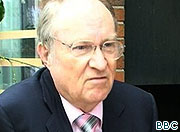The founder of the Swiss suicide clinic Dignitas has called suicide a “marvellous possibility” and says he wants to help healthy people and the mentally ill to die.
Ludwig Minelli prompted outrage with his comments, made yesterday in an interview with the BBC.
The BBC has also been criticised for letting Mr Minelli air his views without providing any balancing opinion from opponents of assisted suicide.
In his first broadcast interview for five years, Mr Minelli said: “I have a totally different attitude to suicide. I say suicide is a marvellous possibility given to a human being.”
He added: “Suicide is a very good possibility to escape a situation which you can’t alter.”
Mr Minelli admitted that Dignitas has helped psychiatric patients die, including people with schizophrenia and bipolar disorders.
A former worker resigned from Dignitas because of the way the organisation dealt with couples and the mentally ill.
Soraya Wernli alleges Mr Minelli dismissed depression as an “irreversible illness”, and he remains under investigation by the Swiss police over claims of exploiting patients for money.
Mr Minelli also admitted that Swiss psychiatrists are refusing to co-operate with Dignitas. A study by Zurich University found that more than one fifth of those who die at Dignitas are not terminally ill.
Mr Minelli said that recent calls to allow assisted suicide for terminally ill patients in the UK do not go far enough.
Instead he argued that healthy people should be assisted to commit suicide if they wish, and revealed his intention to test the legality of such an action under Swiss law.
He said: “It is not a condition to have a terminal illness. Terminal illness is a British obsession.
“We are not a clinic. As a human rights lawyer I am opposed to the idea of paternalism. We do not make decisions for other people.”
He continued: “There is a couple living in Canada, the husband is ill, his partner is not ill but she told us here in my living room that ‘if my husband goes, I would go at the same time with him’.
“We will now probably go to the courts in order to clear this question.”
Mr Minelli also advocated assisting healthy people to die because it would save the NHS money.
“For every 50 suicide attempts we have one suicide and the others are failing, with huge costs for the National Health Service,” he said.
“In many many cases they are terribly hurt afterwards, sometimes you have to put them in institutions for 50 years, very costly.”
Dignitas is believed to have helped more than 100 Britons to kill themselves.
Mr Minelli’s comments provoked widespread condemnation, even among groups campaigning to have assisted suicide legalised in the UK.
Sarah Wootton, chief executive of Dignity in Dying (formerly the Voluntary Euthanasia Society) said: “I am very concerned about Dignitas.
“Mental competence is an essential precursor to an assisted death and we are absolutely immovable on that. We need to give a clear signal that to assist non-terminally ill adults to die is wrong.”
The chief executive of mental health charity SANE said Mr Minelli was offering “a seductive but dangerous solution to the feelings of anguish and hopelessness experienced by some people with mental illness”.
She said the correct response was greater access to effective treatment, rather than the “one-way ticket to despair and unnecessary death” offered by Dignitas.
Dr Peter Byrne, director of public education at the Royal College of Psychiatrists, said he did not believe any British psychiatrist would write a report stating that one of their patients was mentally capable of agreeing to suicide.
“Although it would be possible to say that someone who is miserable or in pain has the capacity to understand that they want to end their life, that could simply be hiding undiagnosed depression,” he said.
“I have seen more than 5,000 people who have attempted suicide and the state of mind is never clear. Hardly any of them after the event still wishes they were dead.”
Anti-euthanasia campaigners warned that Mr Minelli’s attitude showed the dangers of legalising any assistance to commit suicide, and criticised the BBC’s approach to the issue.
A spokesman for the Care Not Killing alliance said: “Once the border on assisted suicides is opened it will be impossible to close.”
“It would have huge public policy consequences for the plight of people who are terminally ill, very old or suffering from mental illness.”
Phyllis Bowman of Right to Life said: “This is exactly what we have been predicting all along. Before long you will be able to get rid of anyone who is a nuisance.”
Simon Calvert of The Christian Institute said: “The BBC is under an obligation to balance its coverage, and it is breathtaking that on this issue of life and death importance it has not bothered to find anyone to put the case against killing.”
The Swiss are currently reviewing their law on assisted suicide amid calls for tougher regulations.
A long list of recommendations drawn up by Switzerland’s main medical ethics commission includes longer assessments, and tougher appraisals of psychiatric patients wishing to kill themselves and couples in apparent suicide pacts.
The commission’s President, Christoph Rehman Sutter, said: “We have this very strange situation of having a practice without regulation. There is no regulation at the moment.”

